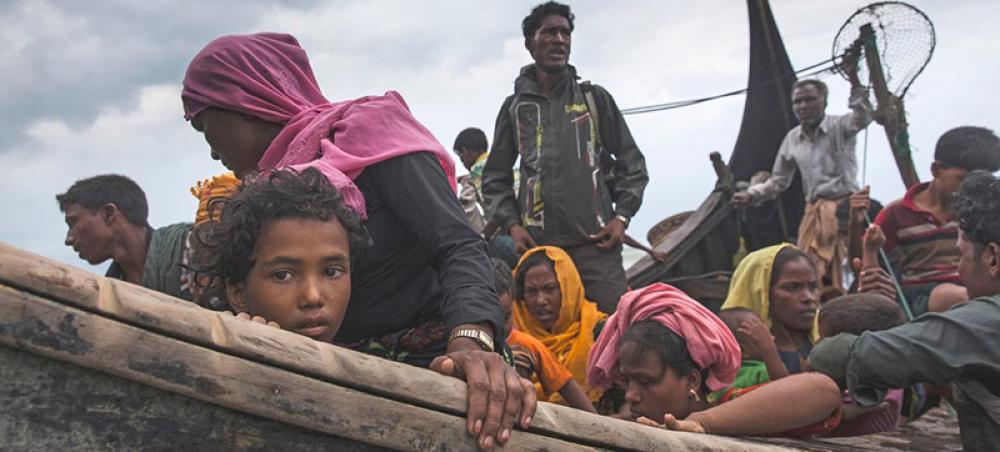Just Earth News | @justearthnews | 24 Dec 2022, 03:22 am Print
 UN Refugee
UN Refugee Image: UNICEF/Patrick Brown
New York: Some 190 desperate people are on the verge of perishing at sea, adrift somewhere between the Andaman Sea and the Bay of Bengal, the UN refugee agency, UNHCR, said on Friday, urging countries in southern Asia to rescue them.
However, its pleas continue to be ignored.
“This shocking ordeal and tragedy must not continue”, said Indrika Ratwatte, UNHCR’s Director for Asia and the Pacific.
“These are human beings – men, women and children”, he added.
Unraveling the situation
Reports indicate that they have been at sea in dire conditions for a month, lacking sufficient food or water, and with no efforts from any States in the region to help.
Many are women and children, with reports of up to 20 people dying on the unseaworthy vessel during the journey.
“We need to see the States in the region help save lives and not let people die”, underscored Mr. Ratwatte.
A month adrift
Since the first reports of the boat being sighted in Thai waters, UNHCR has received unverified information of the vessel being spotted near Indonesia and then subsequently off the coast of the Andaman and Nicobar Islands of India.
Its current location is reportedly once more back eastwards, in the Andaman sea north of Aceh.
UNHCR has repeatedly asked all countries in the region to make saving lives a priority and requested the Indian marine rescue centre earlier this week to allow for disembarkations.
“It is devastating to learn that many people have already lost their lives, including children”, added UNHCR’s Ratwatte.
Deadly year at sea
It is very difficult for UNHCR to verify the information, but if true, the number of dead and missing in the Bay of Bengal and the Andaman Sea will be recorded to nearly 200 this year alone.
All States have a responsibility to rescue those on the boat and allow them to safely disembark in the name of humanity, UNHCR spelled out.
Meanwhile, this shocking number represents around 10 per cent of the estimated 2,000 people who have taken risky sea journeys in the region since January.
“Sadly, this makes it one of the deadliest years in the seas in the region’’, lamented the UNHCR Director.
Saltwater tears
One of the deadliest years in the seas in the region – UNHCR senior official
Yesterday UN-appointed independent human rights expert Tom Andrews issued a statement urging Governments to “immediately and urgently coordinate search and rescue for this boat and ensure safe disembarkation of those aboard before any further loss of life occurs”.
“While many in the world are preparing to enjoy a holiday season and ring in a new year, boats bearing desperate Rohingya men, women and young children, are setting off on perilous journeys in unseaworthy vessels”, said the UN Special Rapporteur on Myanmar.
In his plea to all regional Governments for “a more humane regional response” to those fleeing the junta’s brutal violence, including the Rohingya, Mr. Andrews called for “an absolute moratorium on any deportations or pushbacks to Myanmar” as well as harmonized search and rescues at sea.
Hazardous journeys
This is just the latest in a series of dangerous voyages, said the UN expert.
Two weeks ago, a Vietnamese oil company vessel on its way to Myanmar rescued one sinking boat with 154 Rohingya refugees aboard.
“As they were close to Myanmar waters, they reportedly handed the group over to Myanmar authorities”, he recounted.
“It has been reported that those aboard were placed in migration detention in Myanmar and may now face criminal charges”.
And last weekend, the Sri Lankan Navy rescued a third trawler in distress, carrying 104 Rohingya, including numerous children, some unaccompanied.
“The international community must step forward and assist regional actors to provide durable solutions for the Rohingya”, said Mr. Andrews.
Special Rapporteurs and independent experts are appointed by the Geneva-based UN Human Rights Council to examine and report back on a specific human rights theme or a country situation. The positions are honorary and the experts are not paid for their work.
- Iranian singer Parastoo Ahmadi performs during an online concert without wearing hijab, arrested
- Taliban’s pursuit of ‘Islamic vision’ eroding freedoms in Afghanistan: UN Security Council
- Sixty-eight journalists were killed in 2024, shows latest UNESCO data
- Atrocities against Hindus in Bangladesh: Another priest arrested in Chittagong
- Bangladesh is facing an existential threat, says ex-USCIRF Commissioner Johnnie Moore slamming Yunus administration






